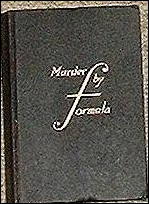Thu 20 Sep 2012
Reviewed by William F. Deeck: J. H. WALLIS – Murder by Formula.
Posted by Steve under Bibliographies, Lists & Checklists , Characters , Reviews[6] Comments
William F. Deeck
J. H. WALLIS – Murder by Formula. Dutton, hardcover, 1931.

During a meeting of the elite Aristoi Club, the Hanging Committee — art, let me hasten to say — discusses crime novels. Several members urge Andrew Wingdon, best-selling author who writes, according to one character, “readin’ books,” to write his own detective novel, or “trash” book. The formula proposed to Wingdon, as he iterates it:
Wingdon begins making notes and the others depart. The next morning Wingdon is found dead in the club, killed more or less in the manner discussed the previous evening.
At the end of his novel, Wallis claims in verse that he himself followed the formula. For the most part I agree with his contention, particularly since fair play was not a criterion.
The investigation by Inspector Jacks, in the first of several novels featuring his alleged abilities, is slipshod or negligent. For example, Jacks is unaware that apartments and houses have rear entrances and that a murderer might use them.
A locked-room murder occurs that is given no thought by Jacks and is explained in one unlikely sentence during a most unlikely denouement. Jacks gives Wingdon’s widow, with whom he is smitten — see the last sentence in the formula — an automatic to protect herself at a meeting she shouldn’t attend but provides no instruction about use of the weapon, though this may be excused, I suppose, because the automatic turns out to be a revolver.
Maybe in his later novels Wallis either is more careful with his plot or writes more persuasively. Maybe.
The Inspector Wilton Jacks series —
Murder by Formula. Dutton 1931.
The Capital City Mystery. Dutton 1932.
The Servant of Death. Dutton 1932.
Cries in the Night.Dutton 1933.
The Mystery of Vaucluse. Dutton 1933.
Murder Mansion. Dutton 1934.
J. H. Wallis has four other works of crime fiction listed in Hubin, including Once Off Guard, which was the basis of the film The Woman in the Window (1944), directed by Fritz Lang. Dan Stumpf reviewed both the book and the film here earlier on this blog.
September 20th, 2012 at 5:00 pm
I’m going to quibble just a little with Bill’s review; when he says “particularly since fair play was not a criterion,” I’d like to point out that Wallis did refer to ‘fair play detection’ when he suggested that “the detective [be] supplied no more information than the reader.”
What also caught my eye in this review was the mention of this being a locked-room murder, although one that was set up rather badly, according to Bill. My copy of Robert Adey’s book on Locked Room Murders has temporarily gone missing. Anyone have a copy to see if MURDER BY FORMULA is included?
September 20th, 2012 at 5:07 pm
PS. I am also stumped by the reference by Wallis to “artificially bred humans.” What was he talking about? Human cloning? In 1931?
September 20th, 2012 at 7:58 pm
LOL, Steve I had the same reaction (see your comment #2). Maybe Wallis had just seen Frankenstein?
September 20th, 2012 at 8:32 pm
I think you have something there, Curt. FRANKENSTEIN the movie came out in 1931, the same year as this book. It never occurred to me.
September 20th, 2012 at 8:53 pm
Wallis has no entry in Adey.
The only Wallis read here is Once Off Guard. It shows some decent plot imagination, material that was incorporated faithfully into the film version.
Yet the story telling is vastly superior in the movie. It grips, while the book doesn’t.
September 20th, 2012 at 9:04 pm
Mike
Bill Deeck implies that the locked room aspect of the case is minor, or at least that’s how Wallis treated it. I’m curious. I’ll have to see if I can’t find an inexpensive copy of MURDER BY FORMULA to see for myself.
I think you and Dan Stumpf are in general agreement. He says about the book, ONCE OFF GUARD: “An involving read, but not much fun.”
And about the movie: “The result is just as involving as Wallis’s book, but much less claustrophobic. […] Also, we get to see things in the movie that in the book are only imagined by Wanley, opening things out a bit.”